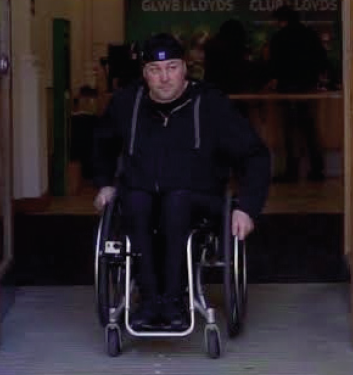 ACCORDING to a report from the House of Lords, the Government is failing wheelchair users in Wales. The report looked at how effective the Equality Act has been and focused on issues like access at railways stations and taxis refusing guide dogs.
ACCORDING to a report from the House of Lords, the Government is failing wheelchair users in Wales. The report looked at how effective the Equality Act has been and focused on issues like access at railways stations and taxis refusing guide dogs.
The report is highly critical stating that disabled people are only an ‘ afterthought ‘ for the government. Peers have said that laws designed to outlaw discrimination in Britain are not working. Examples used included taxi drivers refusing to take guide dogs and wheelchair-using sports fans being forced to sit with opposing fans.
Peers also said that access to public buildings remains an unnecessary challenge. There is a legal obligation to disabled people from public authorities but recent court cases fought by the UK Government have led to disabled people finding it harder to fight discrimination.
Richie Powell became disabled following a motorcycle accident. He had been a promising rugby player and sportsman.
The Herald spent a couple of hours with Richie and he was keen to explain that there are some buildings in Llanelli and Carmarthen, which need to raise their game when it comes to disability access and friendliness but that there are many great examples of disability friendly buildings and staff. He said:
“It is the simple things like the way the furniture is arranged, the space in between so that a wheelchair can get through. It is educating the staff about disability and ensuring they treat disabled people like any other human being.”
Richie said he would agree with the findings of the report and believed that the government should do more to intervene and force legislation to be implemented especially with new builds, new shops and new public buildings.
Richie took The Herald to EJ’s in Llanelli where he says he goes regularly because the staff are very considerate and empathetic and the layout of the building is totally disability friendly.
When we arrive a staff member came over and greeted Richie warmly. He found a place to position his wheelchair with ease. Richie told The Herald that he and his band had played a live music session at the weekend. As we talked we were joined by
Janine Jenkins who said that she overheard us talking about disability and was intrigued to find out who we were. Janine is an NHS occupational therapist uses EJ’s for meetings with a group of disabled clients. She said:
“I use EJ’s for a group of young people aged 18 to 25 and there are few opportunities for them to hang out in the town. Many places have steps and are hard to get around especially if there are two or three wheelchair users going out together.”
Speaking about the need for improvements in disability access in the town she said:
“It is not always easy for older venues to refurbish and become disability friendly. Places like EJ’s level the playing field and allow disabled people to go out to a trendy place where other young people meet. Socialising is particularly important to the group I work with. Llanelli is getting better and people do visit Llanelli because it is so disability friendly.”
Richie said he uses EJ’s most weeks and that it was one of the most welcoming and accessible bars in the town: “EJ’s really goes against the criticism of establishments in Wales and it is a good model to follow.”
He continued: “Some places just have too many chairs and tables and it is pandemonium. Even fire exits get blocked.”
We began talking about other good examples in the town including Richie’s bank. Lloyds Bank is what he sees as a sterling example of a disability friendly building. The doors open automatically. The flooring is smooth and even. The aisles are wide and even.
As Richie enters the bank he is greeted by the manager who asks what he is doing. Richie explained that he was helping The Herald with an article and a film. The manager encouraged us to feel free to look around and take photos.
Richie said that there were places in town that he felt needed improving especially the lifts within the town. He told us that compared with some places in other countries he had visited Wales was lagging behind.
He said the criticism of the UK and Welsh Government was fair and that Wales needs to do better: “They don’t seem to be geared up to people in chairs and scooters. Germany and Holland are excellent places to visit if you happen to be disabled. I think a lot of money needs to be spent in bringing Llanelli up to date. Given the Council cuts it is highly unlikely that that is going to happen.”
We visited Llanelly House, which has had a lot of money spent on it recently. We spoke to Rhys who was serving behind the cafe counter. He said that Llanelly House had good disabled facilities and that they had an access ramp and a lift in the building. Richie was impressed with the building but he did say that he had trouble actually opening the door to the cafe.
Alan Thomas has cerebellar ataxia, a rare condition which affects his speech and mobility.
Alan, from Llanboidy, had always walked with a trademark ‘wobble’ and spoken with a small slur but this was just part of who he was. He found a career as an electrician but it was making sandwiches which showed him something wasn’t quite right. As he told The Herald: “It was buttering some bread that made me want to see a doctor.
“I was back and forwards to the GP, then I saw a locum doctor who arranged some tests and gave me my diagnosis.”
Rather than resting on his laurels Alan realised there was very little information about ataxia available and endeavoured to change this. He wanted to make a difference so people living with ataxia could easily access and obtain information about the condition and eventually became a Trustee of Ataxia UK and the Chairman of Ataxia South Wales.
He has been prominent in campaigning for awareness of his condition and on the rights of the disabled in general.
Having been very active in campaigning, we asked Alan what his motivation was: “When I was diagnosed there was not a lot of information about. I have made it my mission to share information with other people. If I can help one person, I can help a lot. In my daily life, I came up against barriers. I have campaigned to raise awareness of the barriers we face, physical and in relation to people’s attitudes.
“I have all the physical barriers you would expect for a wheelchair user. But the worse barriers, the bigger barriers, are the attitudes of large corporations and the like. Getting through to them and getting them to do things is difficult.
“So I have campaigned online and also in person. My view is that helping one other person, is helping a lot.”
We asked what specific problems Alan encountered locally and he was quick to respond: “Transport. Transport is the major issue. Getting to anywhere. Accessibility to buses and trains and trains is a big problem in a rural area. And then, if you get where you want to go, there’s access into buildings. There are banks I know where if you can’t get in, the staff will see you on the pavement, but that’s not very secure or very pleasant if it’s raining.
“When I travel by train, the step down on to the platform can be quite a problem. You can ring for assistance, but that has to be twentyfour hours in advance. To me, that takes away the chance to be spontaneous.
And you have a problem that while a train may have a ramp, the guard may not know how to use it safely to get you on and off the train. The ramp can be quite steep, if the assistance is there, you’re lucky.
“A lot of stations are not manned; if you use request stops then you have to trust to luck that the train staff will remember and stop. You can’t go anywhere on the spur of the moment. All round here, the trains are an hour to an hour a half apart. I’ve been to London and if you are not on a train there by seven pm to catch the train from London, you can forget coming back to Pembrokeshire that day.”
We asked Alan how he managed to get out and about: “If my girlfriend isn’t about to give me a lift, I’m stuck on using a taxi or community transport. Otherwise it’s friends or families. You can investigate public transport online, but getting to where it is, well, that’s a problem.”
“New buildings are getting better, but then again it is slow progress. You learn to avoid the ones you can’t into: personally I use the internet and Google to check out buildings and venues. You have to do a lot of planning.”
Alan was guardedly positive: “It is improving, though, but at a very slow rate. In West Wales facilities for the disabled are also improving, but again it is slow progress. A group like Nexus Pembrokeshire, of which I am a member, we are getting action by working with communities to make sure facilities are right. I’m concerned that for corporates, like councils, a lot of processes, are tickbox, it’s a question of paying lip service to doing things rather than doing them.”
On his wider campaigning work, Alan told us how he has campaigned from local, to Welsh Government, and as far as European level: “Communication is the important thing. I am widely involved and information has to be shared. It is important to get the patients’ voices heard.
I do a lot off my own bat, but I think some of this information should be provided by local councils. They are there to serve their customers and communities. They should be doing more to help to tell people what facilities, advice, and help is available. “I do think that services and facilities for the disabled are a bit better in Pembrokeshire than in Carmarthenshire, but I go to Carmarthen Tesco to shop because it is more accessible for me. That’s the only real reason I would go to Carmarthen.”
You can watch our film of Richie going around Llanelli online at www.facebook.com/llanelliherald


















Add Comment